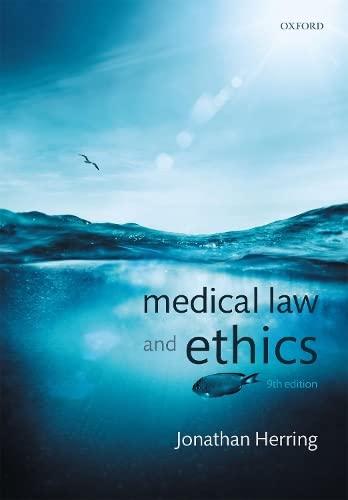Question
(a) Under Crawford, a witness's testimony against a defendant is inadmissible unless the witness appears at trial or, if the witness is unavailable, the defendant
(a) UnderCrawford,a witness's testimony against a defendant is inadmissible unless the witness appears at trial or, if the witness is unavailable, the defendant had a prior opportunity for cross-examination.541 U.S., at 54, 124 S.Ct. 1354. The certificates here are affidavits, which fall within the "core class of testimonial statements" covered by the Confrontation Clause,id.,at 51,124 S.Ct. 1354. They asserted that the substance found in petitioner's possession was, as the prosecution claimed, cocaine of a certain weight the precise testimony the analysts would be expected to provide if called at trial. Not only were the certificates made, asCrawfordrequired for testimonial statements, "under circumstances which would lead an objective witness reasonably to believe that the statement would be available for use at a later trial,"id.,at 52,124 S.Ct. 1354,but under the relevant Massachusetts law theirsole purposewas to provide prima facie evidence of the substance's composition, quality, and net weight. Petitioner was entitled to "be confronted with" the persons giving this testimony at trial.Id.,at 54,124 S.Ct. 1354. Pp. 2531-2532
Question 1
Is there any rationale for giving either propranolol, valproate or
buspirone to patients with cerebellar ataxia?
Question 2
Is there a laboratory marker for cerebral dominant arteriopathy with
subcortical infarcts and leucoencephalopathy (CADASIL)? Is serum lactic
acid elevated?
Question 3
Primary brain tumours rarely metastasize outside the brain but
malignancies outside the brain frequently metastasize to the brain. Why?
Question 4
In a case of brain tumour, can papilloedema occur without a headache?
Question 5
What are the pathological diagnostic features of glioblastoma
multiforme?
Question 6
Is acetazolamide effective in cases of normal pressure hydrocephalus?
How effective is low-dose digoxin?
Question 7
If dementia and incontinence are present, but gait apraxia is not, can
normal pressure hydrocephalus be diagnosed?
Question 8
Is a normal CT (plain and with contrast) in patients with headache,
bilateral papilloedema and a clear conscious level sufficient to diagnose
benign intracranial hypertension?
Question 9
What is the value above which cerebrospinal fluid (CSF) pressure is said
to be raised?final 160
Question 10
Could benign intracranial hypertension be diagnosed without headache
as a complaint?
Step by Step Solution
There are 3 Steps involved in it
Step: 1

Get Instant Access to Expert-Tailored Solutions
See step-by-step solutions with expert insights and AI powered tools for academic success
Step: 2

Step: 3

Ace Your Homework with AI
Get the answers you need in no time with our AI-driven, step-by-step assistance
Get Started


